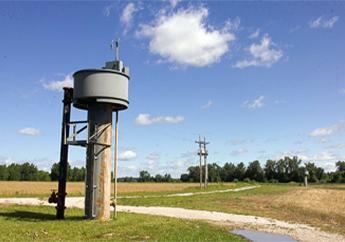
The department’s Water Protection Program administers clean water and drinking water responsibilities for Missouri. The program is delegated by the U.S. Environmental Protection Agency to conduct duties for the federal Clean Water Act and Safe Drinking Water Act. The program also carries out state responsibilities, such as operator certification and construction permitting. The Water Protection Program works with stakeholders, the general public and regulated facilities to comply with state and federal water regulations.
The program's Water Pollution Control Branch regulates pollutants entering the state’s waters by issuing permits for the construction and operation of wastewater treatment facilities and stormwater discharges. Permits set wastewater treatment levels necessary to protect water quality. These treatment levels are included in permits issued to municipal, industrial and other dischargers. The program evaluates discharge monitoring and other data to determine whether facilities comply with applicable laws and whether permits are sufficient to protect water quality. The program, with the Division of Environmental Quality’s regional offices, is responsible for the inspection and monitoring of water contaminant sources and investigates complaints from the public. If a source violates the Missouri Clean Water Law, the program works with the facility to correct the problem and may assess penalties if necessary.

Water quality standards protect beneficial uses of water such as swimming, maintaining fish and other aquatic life and providing drinking water for people, livestock and wildlife. The program, with the Clean Water Commission, develops water quality standards that provide clear expectations for Missouri water quality and conducts monitoring to determine if the standards are met. Waters that do not meet these standards are placed on the impaired waters (303(d)) list, which provides a focus for special attention to restore water quality in the lakes, streams and rivers. Once a waterway is added to the 303(d) list, the department develops and implements a study to correct the water impairments. Generally, this study takes the form of a total maximum daily load document. It describes the maximum amount of a pollutant that may enter a water body without violating water quality standards.
The program's Public Drinking Water Branch reviews plans and issues permits for the construction and operation of public drinking water systems. These systems are required to monitor for contaminants and take corrective action if any health-based standards are exceeded. The program performs drinking water monitoring and conducts periodic inspections and provides compliance assistance on water supply problems to cities, water districts, subdivisions, mobile home parks and other facilities.
Meet the Director - Heather Peters

Heather Peters became director of the Water Protection Program, effective Aug. 1, 2025. For 25 years, Heather has held various roles within the department's Division of Environmental Quality. Most recently, she served as the Water Protection Program, Water Pollution Control Branch Chief, overseeing permitting, engineering, enforcement, data management and watershed protection activities.
Earlier in her career, Heather served as the Watershed Protection Section Chief, supporting and leading the team responsible for developing water quality standards, assessing water quality in waters of the state, developing Total Maximum Daily Loads (TMDLs) and supporting nonpoint source efforts to protect and improve water quality. She also served as the Industrial Permitting Unit Chief, regulating concentrated animal feeding operations (CAFOs), power plants, mining and other industrial facilities and their potential impacts to Missouri waters. Prior to working in the Water Protection Program, Heather worked in the division's Air Pollution Control Program and former Hazardous Waste Management Program.
